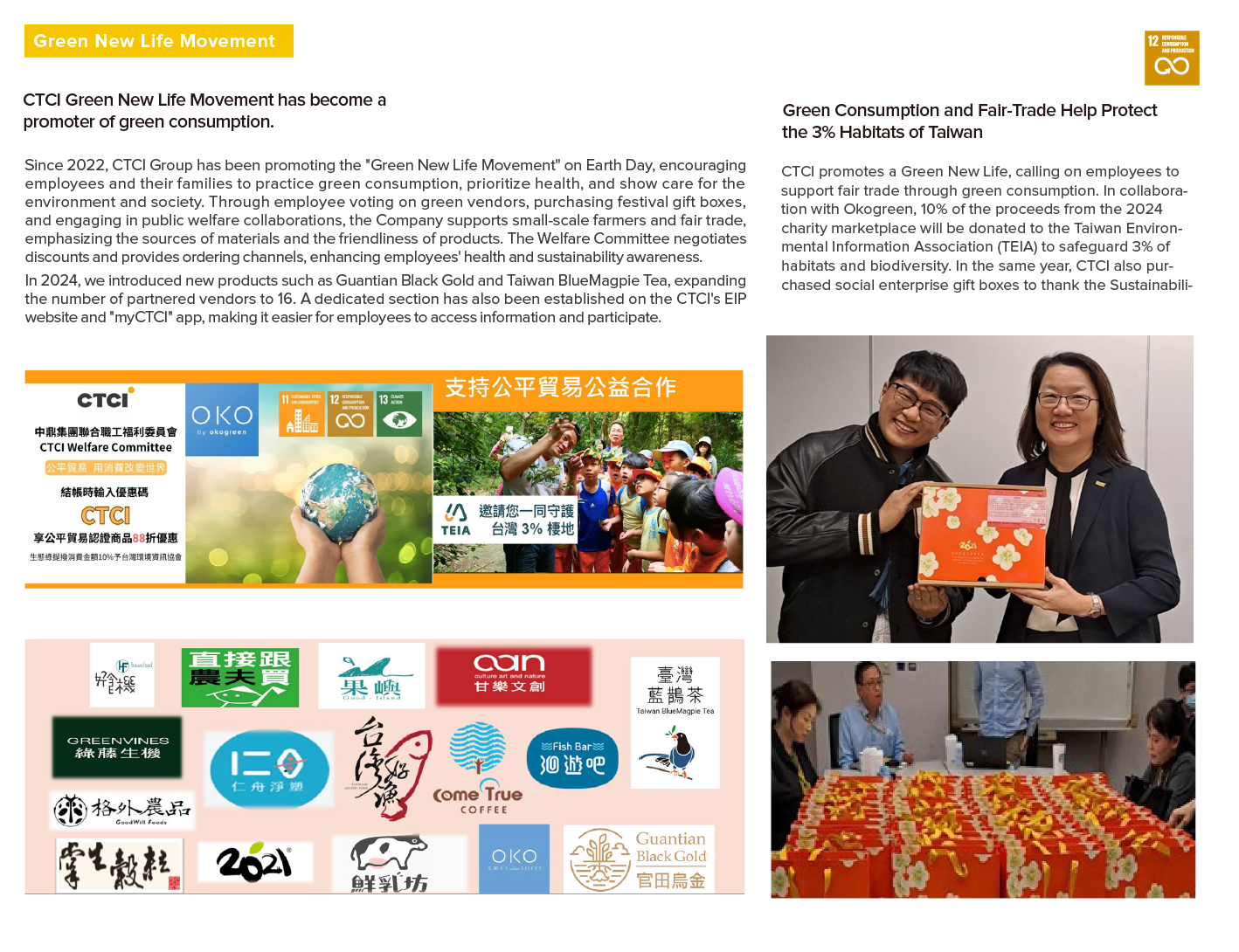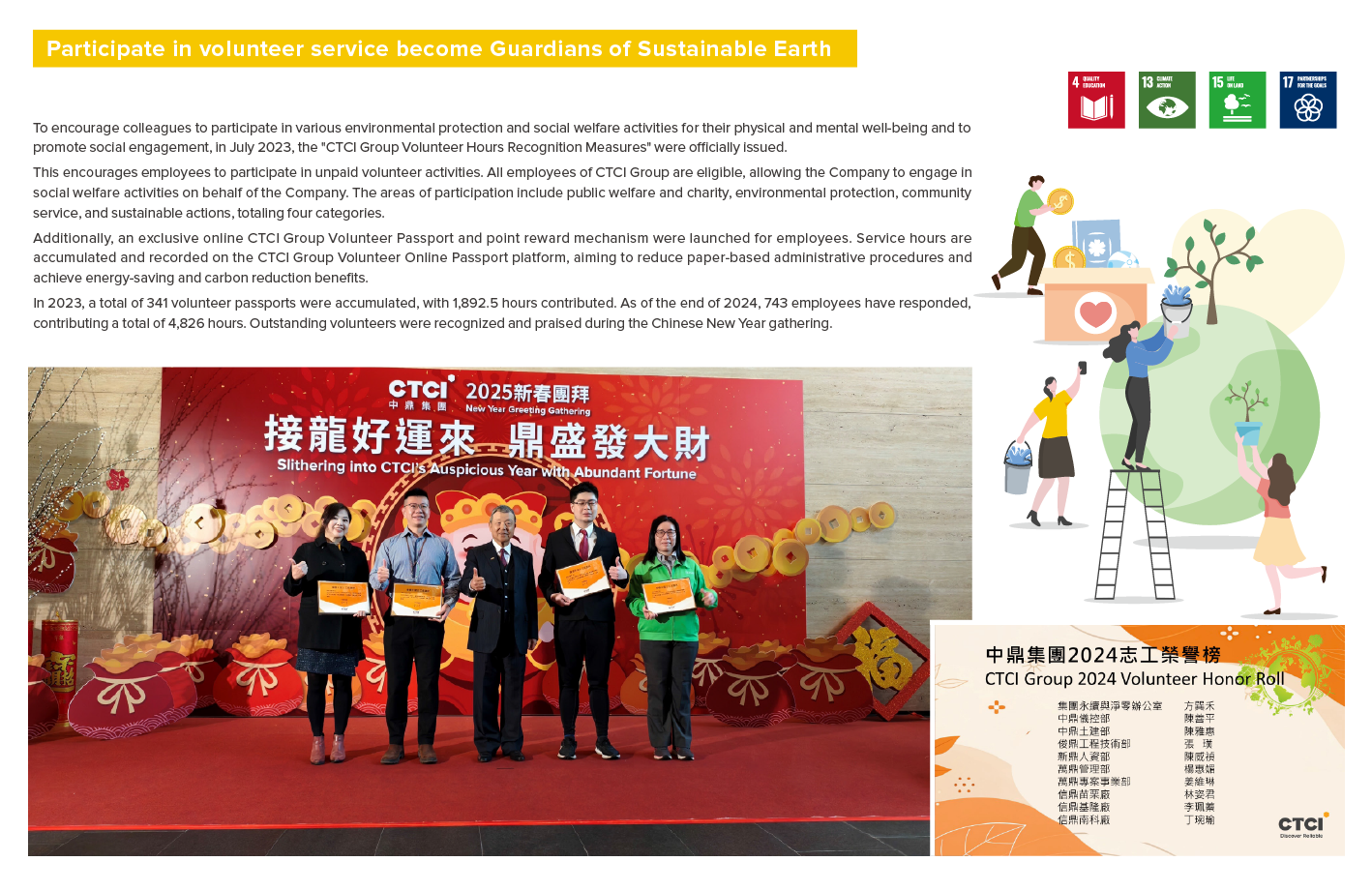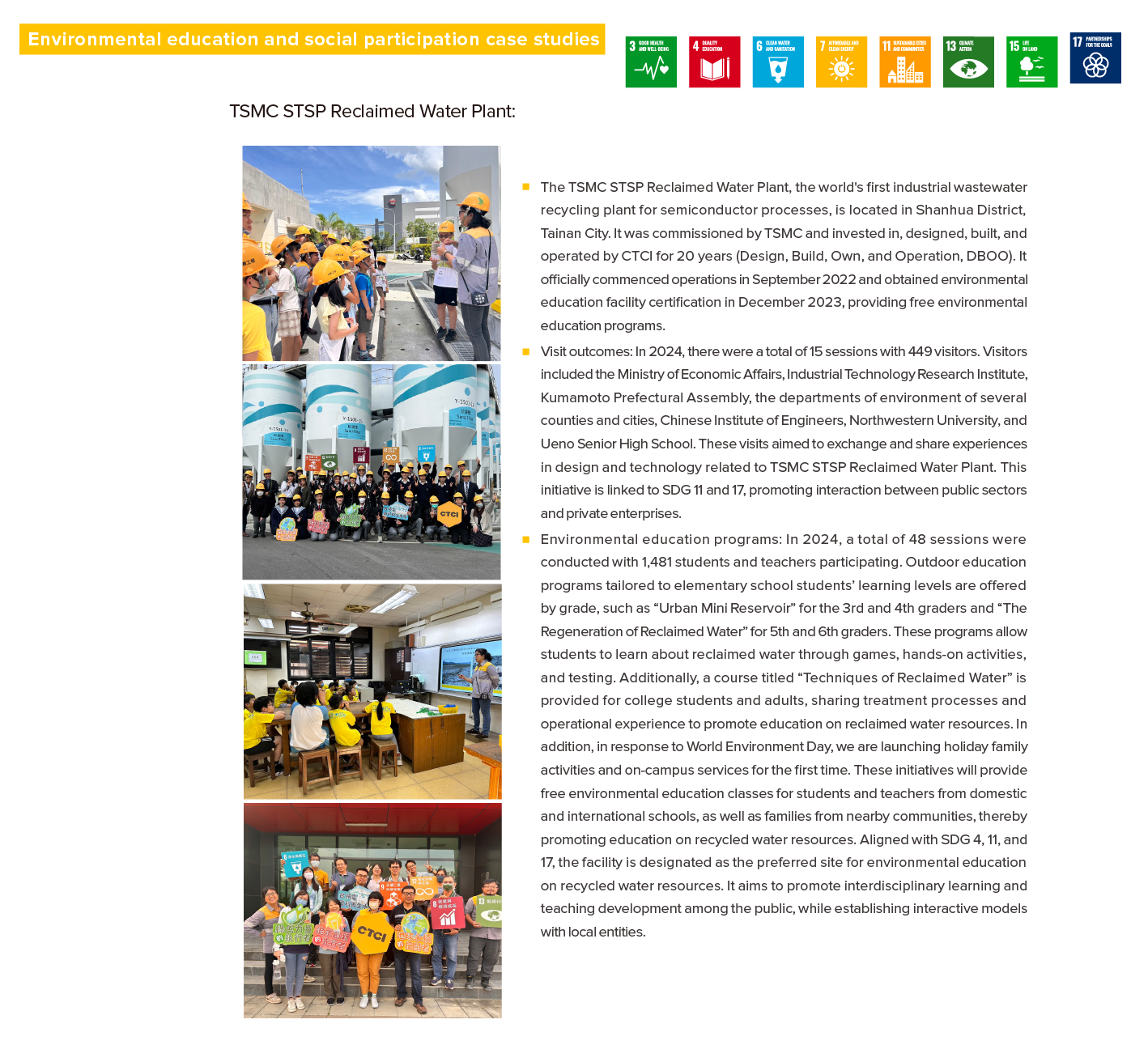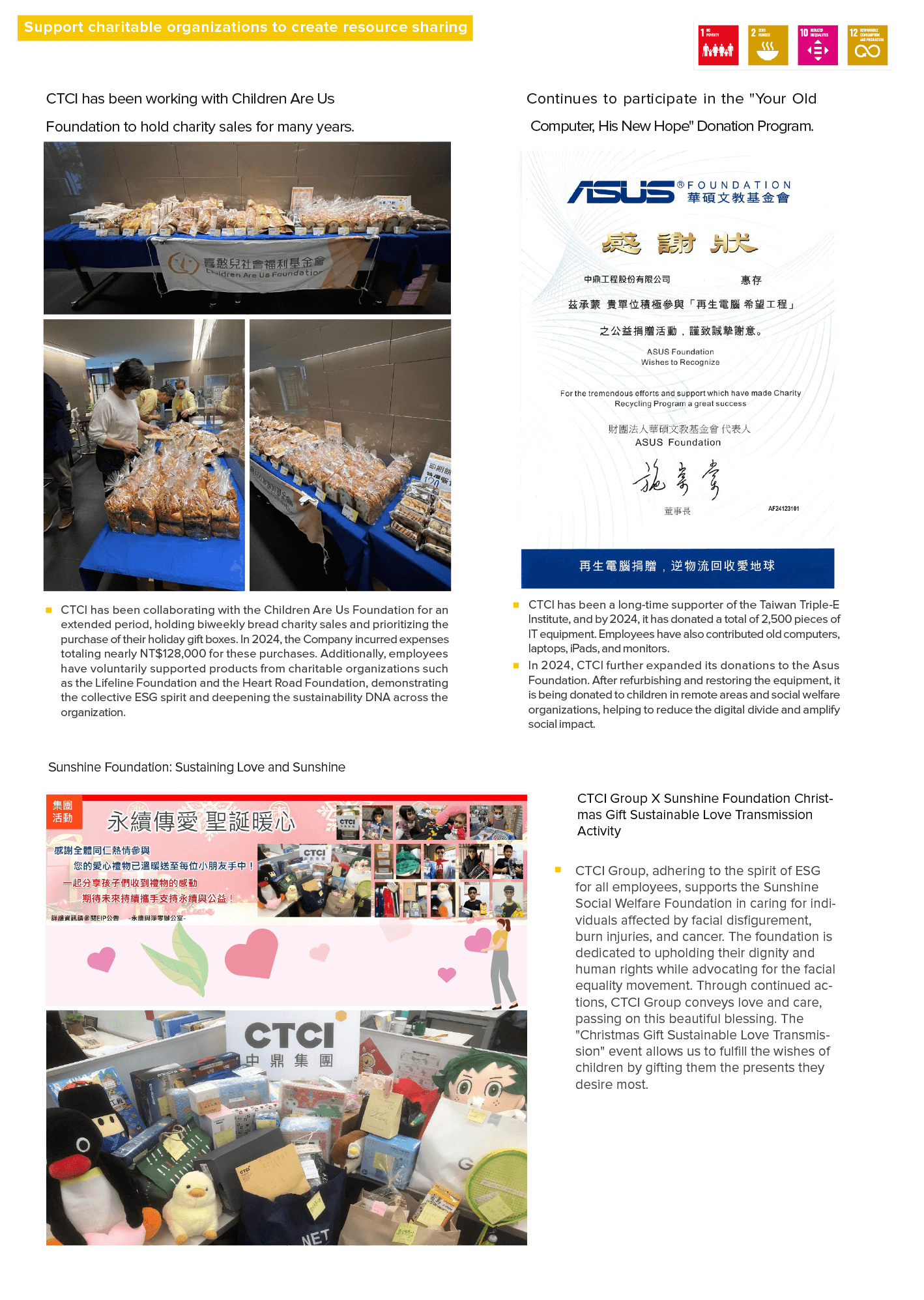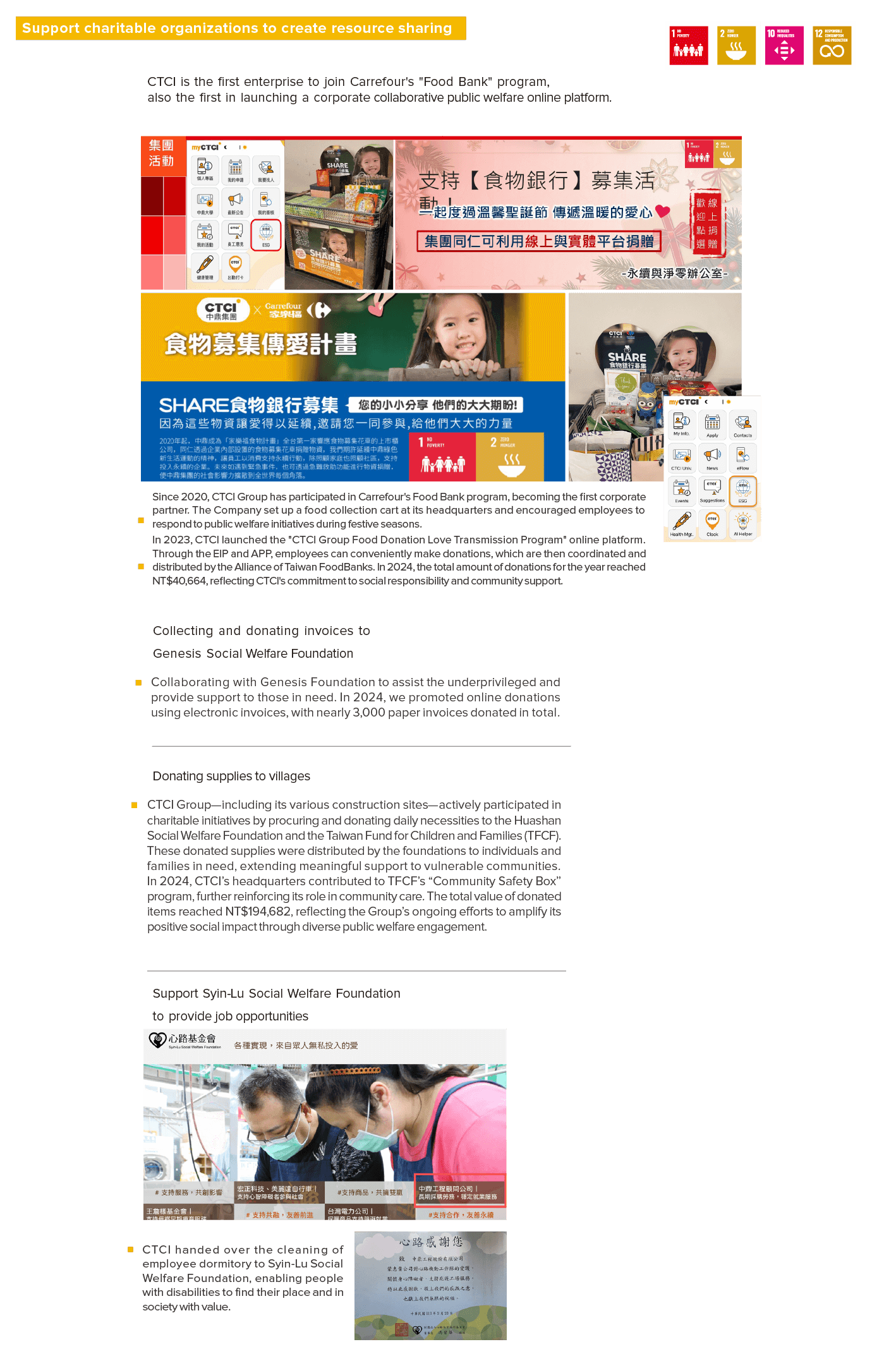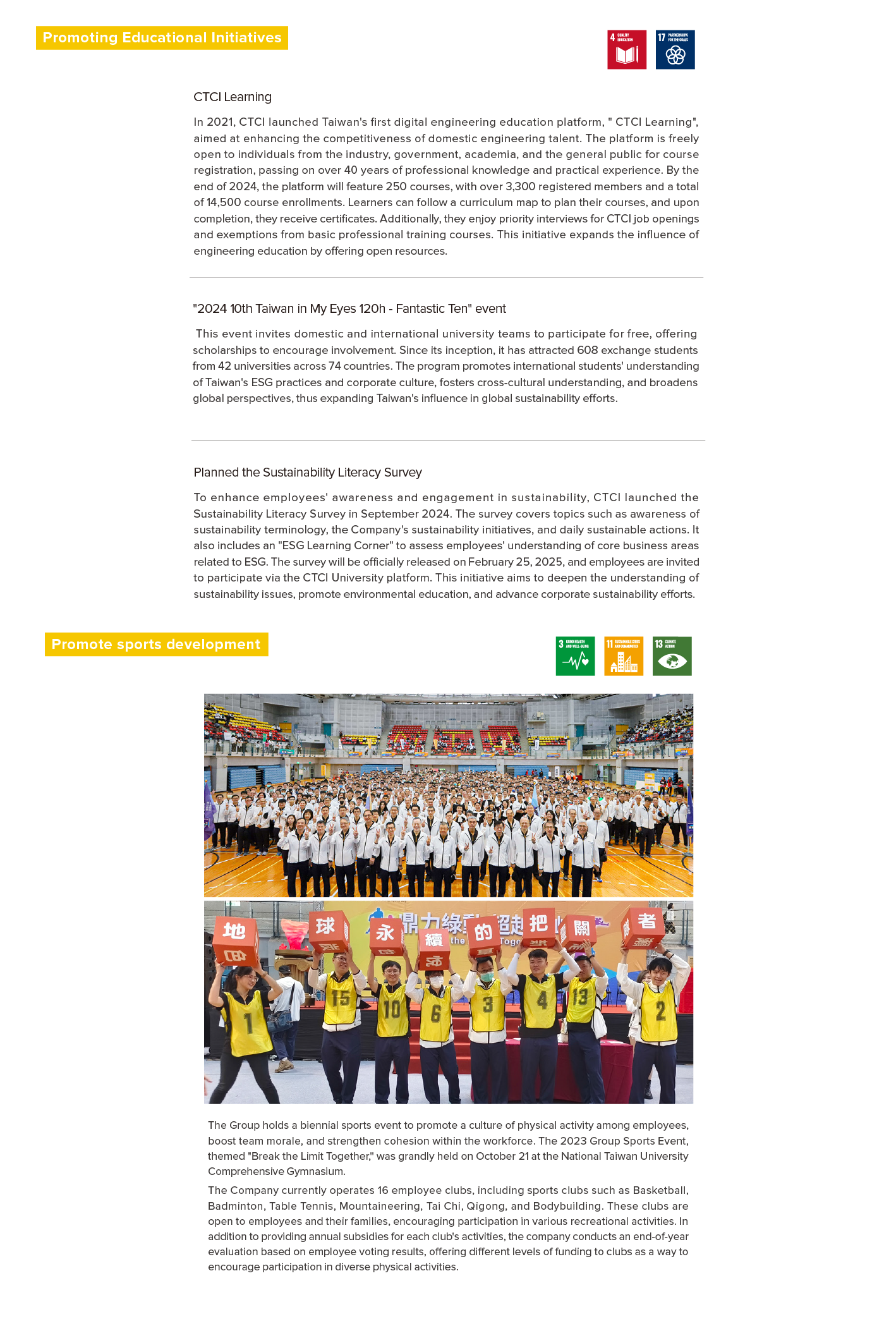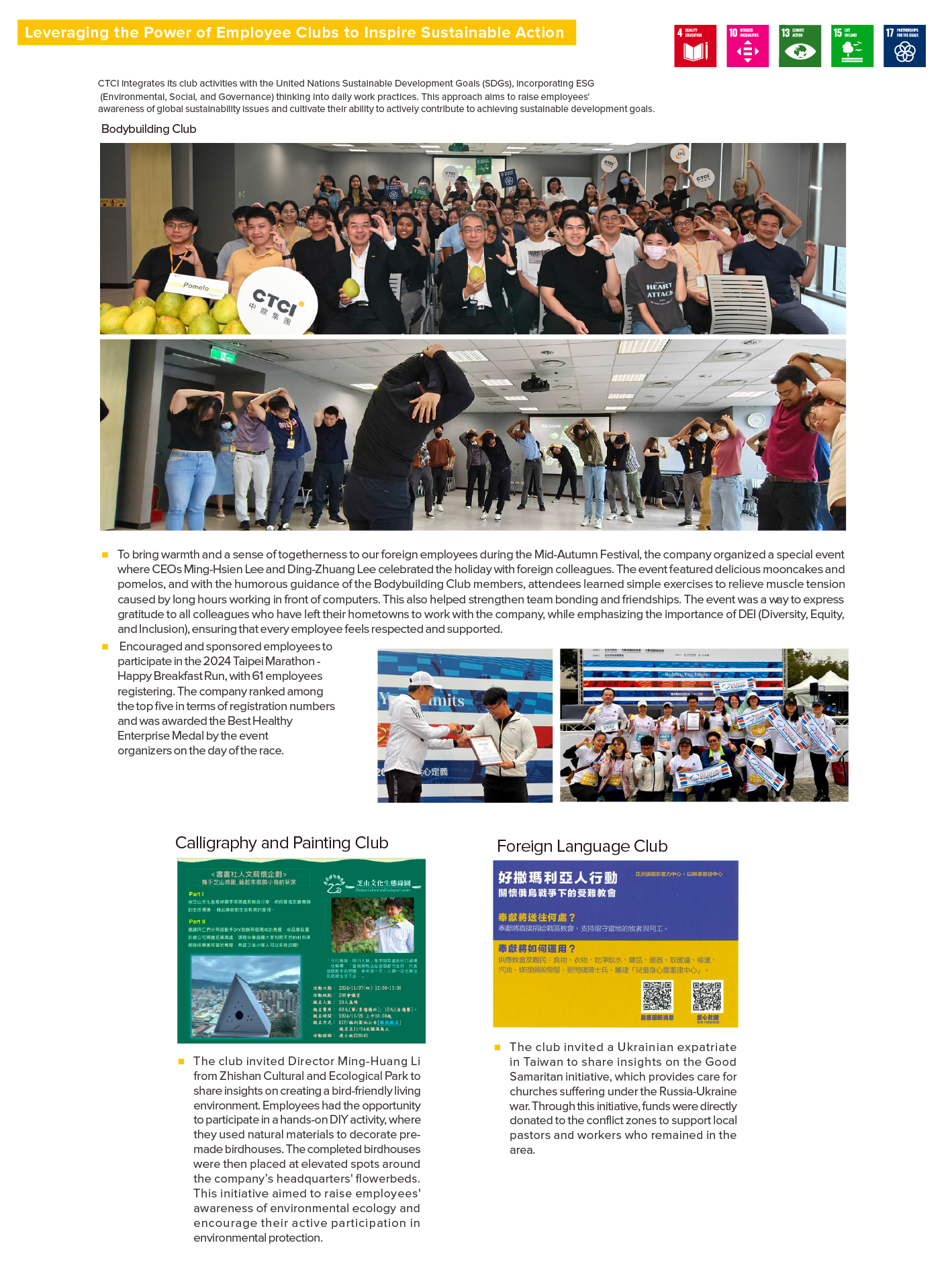Corporate Citizenship

Engineering and Social Welfare
Fostering Engineering Talents
CTCI not only provide our employees with a variety of educational training resources to enhance their professional competency, but also capitalize the knowledge power of our senior engineers and senior managers, who deliver lectures in engineering departments of universities and share practical experience with the academia. Moreover, we offer students from engineering-related departments and those interested in engineering opportunities with internship opportunities to minimize the gap between the industry and the academia. CTCI aims to nurture and reward outstanding young students, starting from the foundation of education.
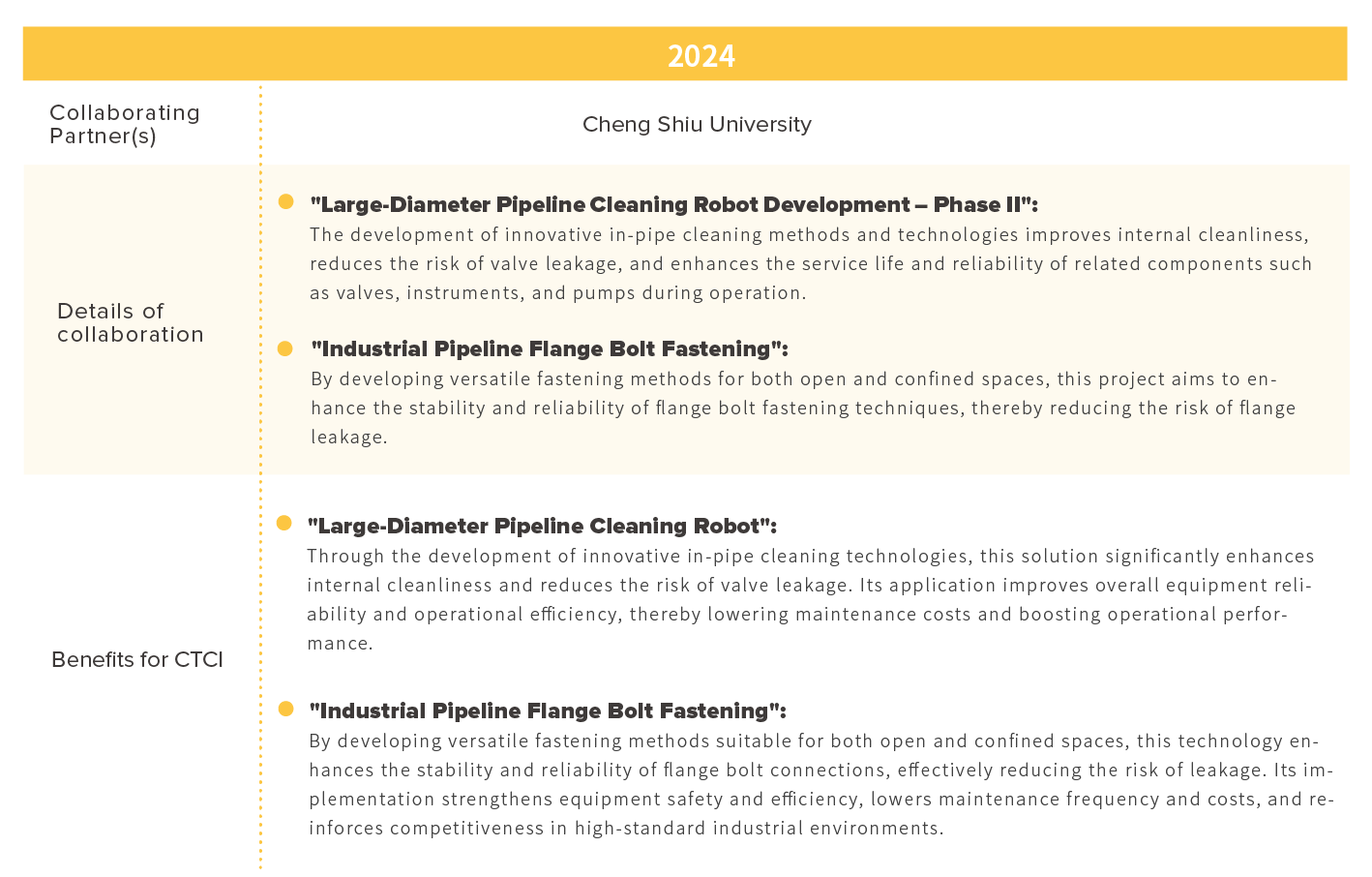
Exerting Industry Influence: CTCI and NTU Join Forces to Cultivate Future Sustainable Talent
In response to the demands and challenges of global green transformation in the engineering sector, the initiative explores how universities can promote interdisciplinary talent cultivation in green engineering. By introducing innovative training mechanisms, developing tailored curricula and teaching resources, and building a collaborative industry-academia education platform, the program aims to align precisely with future industry talent needs and jointly advance the goal of net-zero carbon emissions. This project is not only a short-term collaboration but also aims to establish a sustainable and scalable model of industry-academia cooperation, serving as a paradigm for the Ministry of Education to promote across major universities in Taiwan. In the future, CTCI will continue to focus on engineering expertise as its core, integrating educational resources with student needs, and enhancing curriculum design, internship systems, and project collaborations. This aims to cultivate a new generation of talent in Taiwan's engineering sector that possesses both sustainable thinking and professional capabilities.
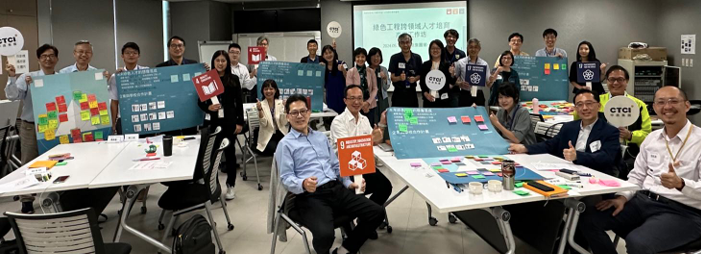
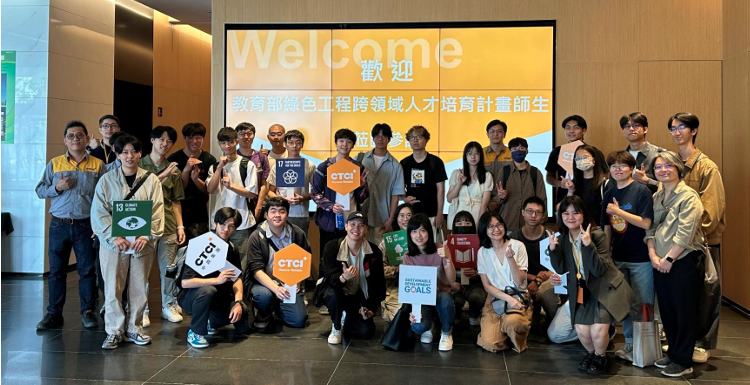
External Initiatives
Participation in Academic and Professional Associations
As a leader in the engineering service industry, CTCI actively participates in academic , occupational and business associations in the engineering profession and sustainable development-related fields, enabling CTCI to interact and cooperate with other enterprises, academies, and professional groups to solve common problems, provide appropriate policy suggestions, and promote the sustainable development of the industry in an effort to enhance the nation’s competitiveness. In 2024, CTCI became a member of a total of 59 associations, both at the group level and through individual membership, subsidizing 689 participants and engaged in professional training, co-organized and sponsored events, contributed articles, sponsored journals, investing a total of NT$4,329,650.
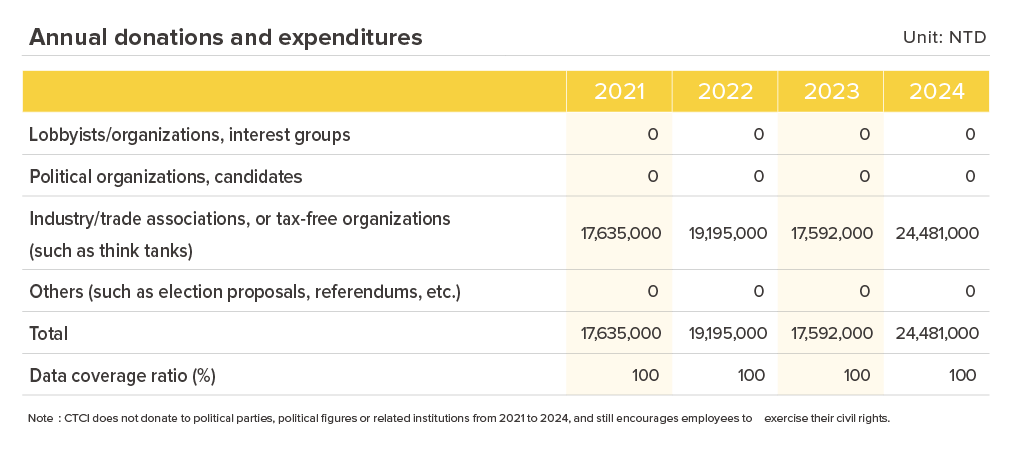
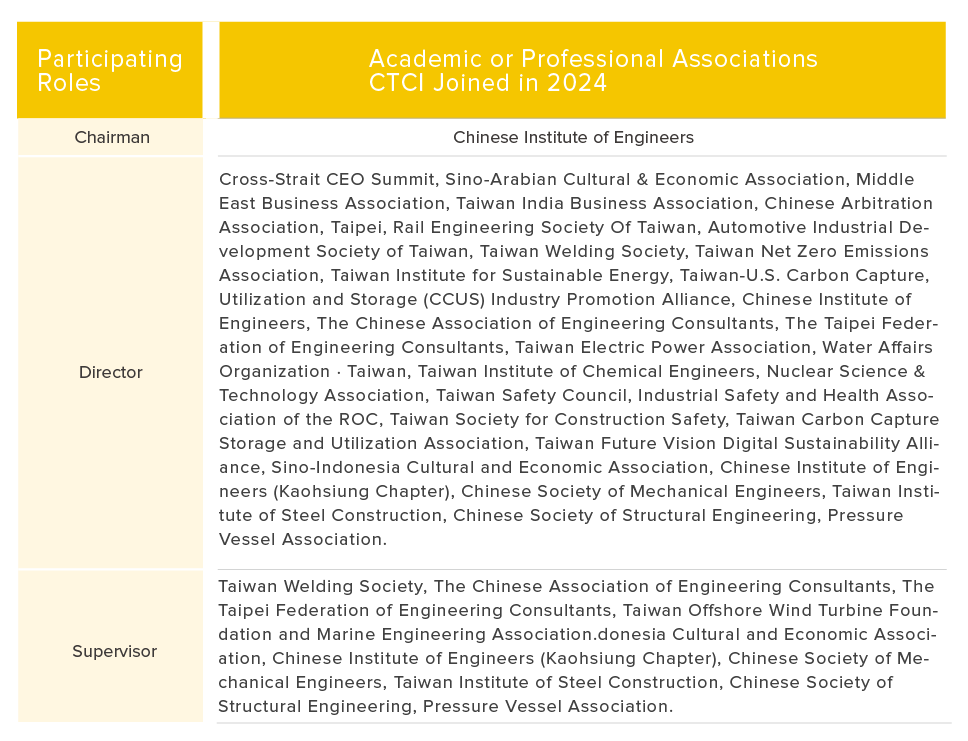
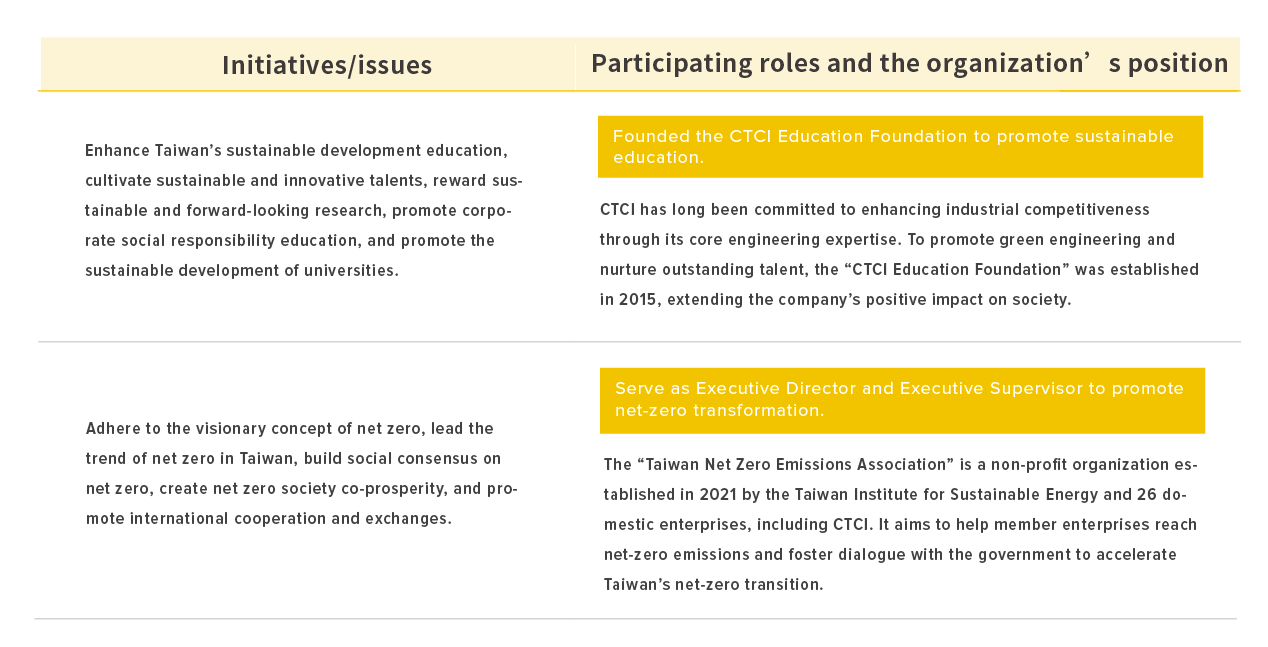
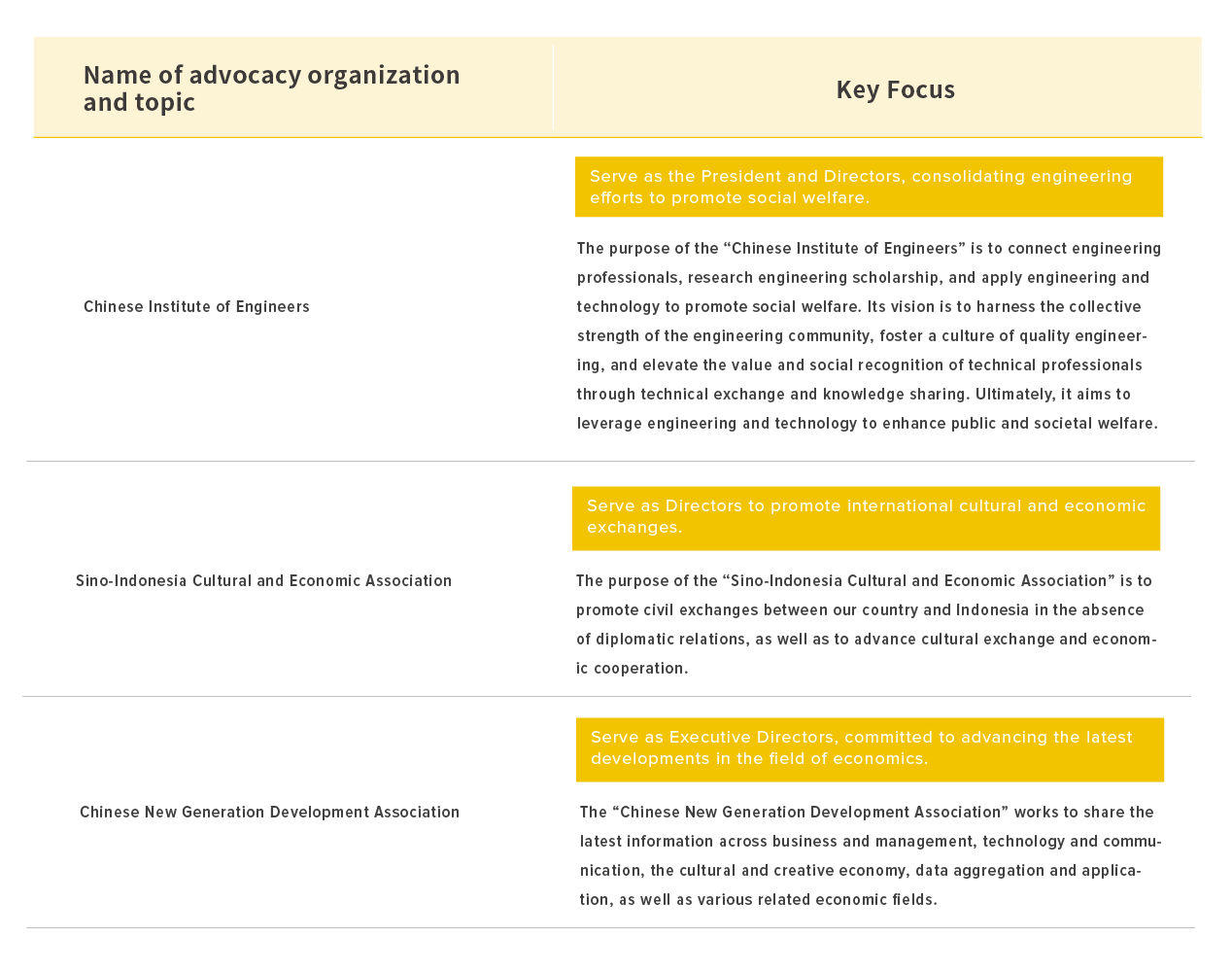
Climate-related lobbying and external engagement management system
In 2024, CTCI did not conduct direct lobbying and participated in a total of 59 trade associations,and 10 of them were identified as climate-related trade associations, accounting for 17%, and were included in the management objects of the climate-related trade association management system. The 10 trade associations are: Chinese Institute of Engineers, CTCI Education Foundation, Taiwan Institute for Sustainable Energy, Taiwan Net Zero Emissions Association, Taiwan-US Carbon Capture, Utilization and Storage (CCUS) Industries Promotion Alliance, Taiwan Carbon Capture Storage and Utilization Association, Taiwan Electric Power Association, Taiwan Society for Circular Economy, CommonWealth Sustainability, and Global Views Monthly ’s ESG Alliance. After reviewing and monitoring, there are no trade associations with misalignment goals. Climate change is a major challenge facing the world today. CTCI understands the risks posed by climate change and has been supporting the goals of the Paris Agreement. CTCI has formulated a climate policy that is “unified and external, to work with different organizations to control the increase of the Earth's temperature within 2 degrees Celsius compared with the pre-industrial era, and strives to pursue the harder goal of continuing to reduce the temperature rise to 1.5 degrees Celsius.” With the participation of external organizations such as associations, a supervision and review mechanism has been established to ensure the implementation of CTCI’s climate policy. Establish a climate lobbying management system for climate-related lobbying activities. The management scope includes the company and global subsidiaries. Its structure is divided into two methods: direct lobbying and trade associations to supervise and manage the company's lobbying activities and the qualifications of trade associations, ensuring that climate-related public engagement is aligned with the goals of the Paris Agreement.
Direct Lobbying
In order to maintain transparency and neutrality, CTCI mainly provides reference for the formulation of climate-related policies and laws through industry associations. However, if there is a need for direct lobbying on policies, it will strictly comply with local lobbying regulations. CTCI’s direct lobbying management system and monitoring process are as follows: 1. Lobbying content must comply with CTCI’s climate policy and the Paris Agreement. 2. It needs to be evaluated by the ESG and Net Zero Team, and then submitted to the ESG and Net Zero Committee for approval before proceeding. 3. Subsequently, the Social Section of the ESG and Net Zero Team will track the implementation progress and confirm whether the policies and laws lobbied for are aligned with the goals of the Paris Agreement, such as climate change adaptation and 2050 net zero emissions. If the lobbying is aligned with goals, will continue to promote; if not, will eliminate the lobbying. Report progress and results to the Board and ESG and Net Zero Committee annually.
Trade Association
CTCI actively participates in climate-related trade associations and hopes that the associations' concepts of responding to climate change and promoting net-zero emissions will be more consistent with CTCI. CTCI’s climate-related trade association management system and monitoring process are as follows: 1. Identify climate-related trade associations: The ESG and Net Zero Team conducts a survey of global trade associations that participate as members at the end of each year, identifying those whose main purpose is to respond to climate change and the Paris Agreement, or who are active in speaking out, promoting, education, advocacy, policy suggestions and other items about climate change-related issues shall be included in the management objects of this program. 2. Review and monitor whether trade associations comply with the Paris Agreement: The ESG and Net Zero Team reviews the management objects and evaluates them based on the climate policy positions publicly stated by climate-related trade associations and related speeches, promotions, education, initiatives, and policy recommendations. Whether they support and comply with the goals of the Paris Agreement, such as supporting 2050 net-zero emissions and controlling warming well below 2°C. After the evaluation, trade associations are divided into two categories: those with aligned goals and those with misaligned goals. 3. If it is found that a trade association is misaligned with the goals of the Paris Agreement, CTCI will take corresponding measures: express opinions to the association, withdraw from the association if there is no improvement within two years, or even boycott the association to express CTCI's emphasis on climate change and ensure actions are consistent and forceful.
In terms of implementing green commitments, CTCI is a founding member of the "Taiwan Net Zero Action Alliance" and the "Taiwan Net Zero Emissions Association" and serves as the first executive director and director; it pays special attention to carbon capture, utilization and storage technology (CCUS) and served as the convener of the "Carbon Capture Group" of the Taiwan-US CCUS Industry Promotion Alliance (TUCA) to promote the development of net-zero technology, foster the achievement of Taiwan’s 2050 net-zero transition goals, and expand research exchanges and cooperation opportunities among international industries, governments, academia and research institutions. In 2023, the Taiwan Net Zero Emissions Association hosted the CCUS Forum and the Hydrogen Energy Forum at the Asia-Pacific Sustainability Forum to discuss the latest technologies and development trends and accelerate the country's progress of achieving net-zero goals. In 2023, CTCI participated in a total of 59 trade associations, and 10 of them were identified as climate-related trade associations, accounting for 17%, and were included in the management objects of the climate-related trade association management system. The 10 trade associations are: Chinese Institute of Engineers, CTCI Education Foundation, Taiwan Institute for Sustainable Energy, Taiwan Net Zero Emissions Association, Taiwan-US Carbon Capture, Utilization and Storage (CCUS) Industries Promotion Alliance, Taiwan Carbon Capture Storage and Utilization Association, Taiwan Electric Power Association, Taiwan Society for Circular Economy, CommonWealth Sustainability, and Global Views Monthly ’s ESG Alliance. After reviewing and monitoring, there are no trade associations with misalignment goals.
Social Care
As a leader in the engineering sector, we fulfill our role as a corporate citizen, we actively participate in all kinds of charity events, engage in community campaigns, care for the environment and eco-system, and exert our efforts to social charity and welfare events.
